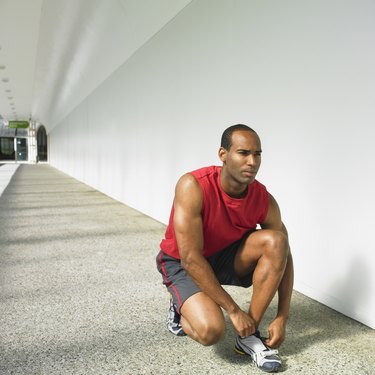
In most cases, a child who is pigeon-toed will gradually outgrow the condition. Even adults who remain pigeon-toed, in most cases, will not experience any noticeable negative effects, including when running. However, if joint pain does begin to develop, you may need to seek a doctor's advice; he may recommend special shoes or even corrective surgery.
Definition of Pigeon Toes
Video of the Day
A person who is pigeon-toed has feet that are angled toward each other, rather than forward and away from each other as they normally would do. This condition is particularly common in children; the majority of the time, a child with pigeon toes will gradually grow out of them, according to the Colorado Foot Institute. Even adults with pigeon toes, however, are usually not significantly hampered by the condition in their daily lives.
Video of the Day
Causes of Pigeon Toes
Pigeon toes in children less than 2 years old are generally caused by a minor twist in the shin bone below the knee -- typically a result of the way they were positioned in the womb prior to birth. The more the child runs and walks, in most cases, the more the problem will go away. Pigeon toes in older children, especially girls, is generally caused by a twist in the thigh bone above the knee. Having the child sit with her legs uncrossed will often help the condition gradually go away, although, according to University of Iowa Health Care, the process may take several years.
Running Benefits
It is difficult to define or quantify the exact impact of being pigeon-toed on running or athletic speed because a wide variety of other factors affect this ability. However, pigeon-toed athletes have traditionally been considered to be somewhat faster or more explosive than other athletes. According to Elite Track, this is because in an ordinary runner's gait, the outer edge of the foot strikes the ground first, and gradually rolls inward. This somewhat diffuses the force of the foot striking the ground; a pigeon-toed runner, on the other hand, loses less of the impact, which then generates forward motion.
Running Risks
If the joints of a pigeon-toed runner diffuse less impact than the joints of other runners, that means that the strain of running can be more harmful to the pigeon-toed runner. If you are pigeon-toed and begin to feel unusual pain in your ankles or knees from running, you may need to be fitted for special shoes or shoe inserts to help provide your joints with additional support.